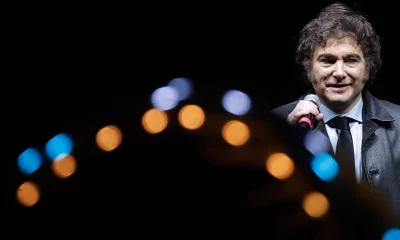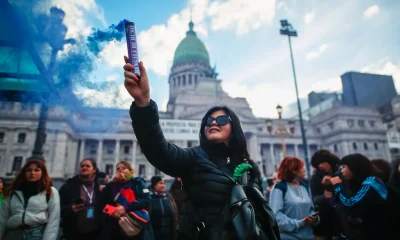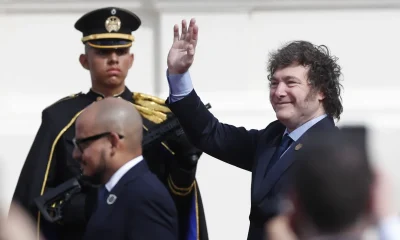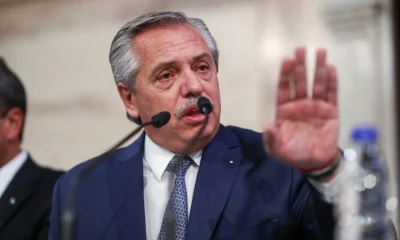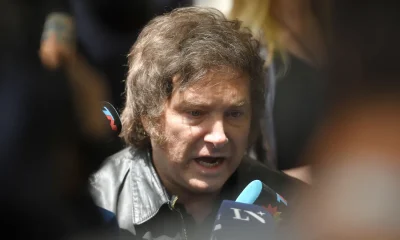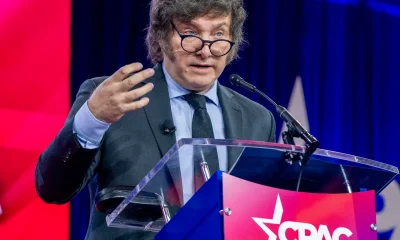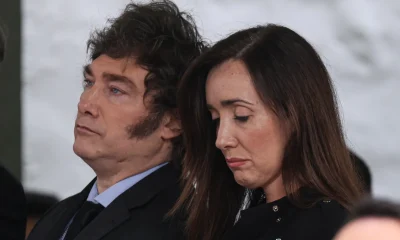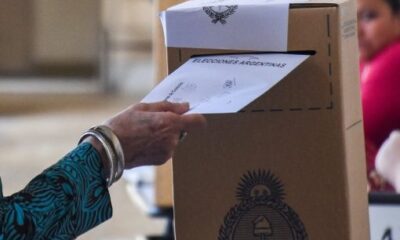International
MEP Miguel Urbán charges Milei for questioning the historical memory
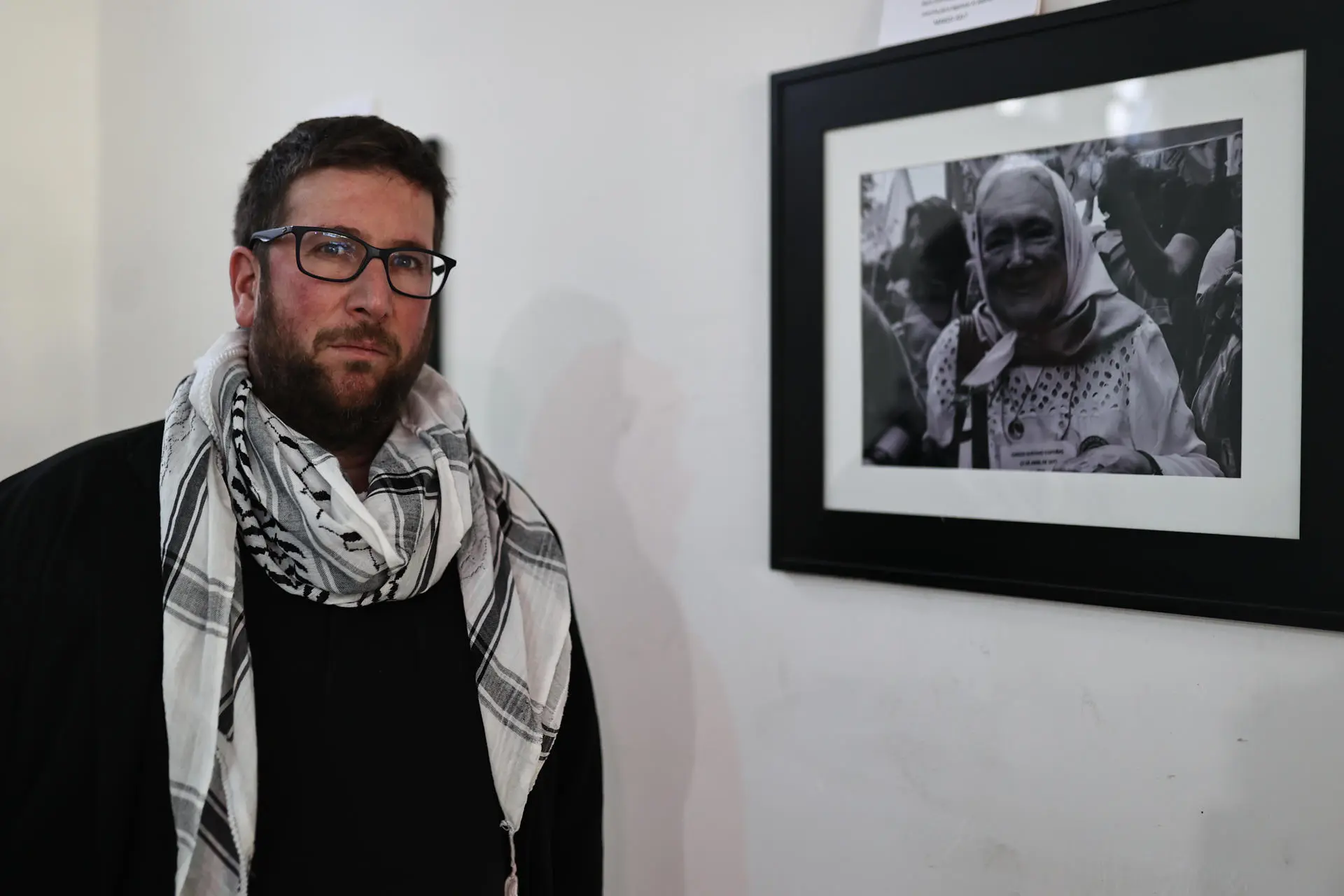
Spanish MEP Miguel Urbán considers that the Government of Argentina, headed by the ultraliberal Javier Milei, and other far-right-wing Executives of the world seek to question the policies of historical memory so that the flame of the struggle of the present cannot be ignited in the reading of the past.”
“It is a common feature and a deliberate attack on what the democratic foundations would be,” says in an interview with EFE in Buenos Aires, this member of the European Parliament since 2015, a central figure of the Anti-Capitalist political organization – which was integrated into Podemos from its foundation until 2020 -, and author of the essay ‘Trumpisms’.
Urbán, son of a communist militant tortured during the Franco dictatorship (1939-1975) by the policeman Antonio González Pacheco, better known as ‘Billy el Niño’, is in the Argentine capital to, among other reasons, accompany other victims grouped under the so-called ‘Argentine complaint’ against the crimes of the Franco regime.
In addition, this Sunday he will participate in the mobilization that will take place in Buenos Aires within the framework of March 24, Day of Remembrance for Truth and Justice, in which the victims of the last Argentine military dictatorship (1976-1983) are commemorated, on the anniversary of the coup d’état that overthreuched the democratic powers of the South American country.
The Government of Milei – and particularly the vice president, Victoria Villarruel, with family ties with the military and accused of ‘denialism’ of the crimes of the dictatorship by associations that defend human rights in Argentina – has been equidistant with this symbolic day.
“Obviously we are witnessing a questioning of memory as a questioning of democracy,” says Urbán, who considers that this type of policy is the same as those used by other far-right leaders in the world, such as the Portuguese André Ventura, leader of the Chega! party, or the Spanish Santiago Abascal, president of Vox.
Urbán attributes this trend to the “element of the cultural battle”, usually argued by reactionary leaders to position himself “against the ‘cowardly right’ that does not question the ‘progressive dictatorship’.”
The MEP thinks that Milei is nothing more than “the Argentine decline of this global reactionary wave” that he describes in his latest book and that he presented this Friday in Buenos Aires.
“These phenomena start from eating the political space of the international right (…) Milei could not have been president if he had not managed to get the right to prefer to support him rather than a ‘right-wing uncle’ like Sergio Massa (the presidential candidate of Peronism in the 2023 elections),” says the MEP.
Urbán considers that “the same radicalization” motivated prominent conservative leaders – among them, the former president of the Spanish Government Mariano Rajoy (2011-2018) – to ask for the vote for the far-right Milei in the last Argentine elections.
“(The phenomenon of the extreme right) is not a European measles,” warns Urbán, who calls the importance of the communication skills of far-right leaders or issues such as the rise of disinformation “peripheral”.
“We could not understand this global reactionary wave without understanding that we are facing a real crisis of the regime of capitalism; a crisis resulting from the combination of the neoliberal governance crisis (…) and, on the other hand, the ecological crisis and climate change that constitute a kind of ‘cancellation of the future’,” explains Urbán.
Faced with the anxiety of the present, the MEP, who participated in the 15-M movement (or ‘of the indignadomen’) in Spain in 2011, believes that the extreme right proposes an imaginary of the past “known and that gives assurances.”
“It’s a matter of passion and not of reason,” says Urbán.
In this sense, the MEP believes that Milei’s ultra-liberal positions are more difficult to “inoculate” than those of the Salvadoran president, Nayib Bukele, characterized by his harshness in police action against the violent gangs of the Central American country.
International
U.S. Senate Rejects Budget, Bringing Government Closer to Shutdown Amid DHS Dispute

The U.S. Senate voted on Thursday against a budget proposal in a move aimed at pressuring changes at the Department of Homeland Security (DHS), following the killing of two civilians during a deployment of immigration agents in Minneapolis.
All Senate Democrats and seven Republican lawmakers voted against the bill, which requires 60 votes to advance, pushing the country closer to a partial government shutdown that would cut funding for several agencies, including the Pentagon and the Department of Health.
The rejection came as Senate leaders and the White House continue negotiations on a separate funding package for DHS that would allow reforms to the agency. Proposed measures include banning Immigration and Customs Enforcement (ICE) agents from wearing face coverings and requiring them to use body-worn cameras during operations.
The vote took place just hours after President Donald Trump said he was “close” to reaching an agreement with Democrats and did not believe the federal government would face another shutdown, following last year’s record stoppage.
“I don’t think the Democrats want a shutdown either, so we’ll work in a bipartisan way to avoid it. Hopefully, there will be no government shutdown. We’re working on that right now,” Trump said during a Cabinet meeting at the White House.
International
Trump Says Putin Agreed to One-Week Halt in Attacks on Ukraine Amid Extreme Cold

U.S. President Donald Trump said on Thursday that he secured a commitment from Russian President Vladimir Putinto halt attacks against Ukraine for one week, citing extreme weather conditions affecting the region.
“Because of the extreme cold (…) I personally asked Putin not to attack Kyiv or other cities and towns for a week. And he agreed. He was very pleasant,” Trump said during a Cabinet meeting broadcast by the White House.
Trump acknowledged that several advisers had questioned the decision to make the call.
“A lot of people told me not to waste the call because they wouldn’t agree. And he accepted. And we’re very happy they did, because they don’t need missiles hitting their towns and cities,” the president said.
According to Trump, Ukrainian authorities reacted with surprise to the announcement but welcomed the possibility of a temporary ceasefire.
“It’s extraordinarily cold, record cold (…) They say they’ve never experienced cold like this,” he added.
Ukrainian President Volodymyr Zelensky later commented on the announcement, expressing hope that the agreement would be honored.
International
Storm Kristin Kills Five in Portugal, Leaves Nearly 500,000 Without Power

Storm Kristin, which battered Portugal with heavy rain and strong winds early Wednesday, has left at least five people dead, while nearly half a million residents remained without electricity as of Thursday, according to updated figures from authorities.
The revised death toll was confirmed to AFP by a spokesperson for the National Emergency and Civil Protection Authority (ANPEC). On Wednesday, the agency had reported four fatalities.
Meanwhile, E-Redes, the country’s electricity distribution network operator, said that around 450,000 customers were still without power, particularly in central Portugal.
Emergency services responded to approximately 1,500 incidents between midnight and 8:00 a.m. local time on Wednesday, as the storm caused widespread disruptions.
The Portuguese government described Kristin as an “extreme weather event” that inflicted significant damage across several regions of the country. At the height of the storm, as many as 850,000 households and institutions lost electricity during the early hours of Wednesday.
Several municipalities ordered the closure of schools, many of which remained shut on Thursday due to ongoing adverse conditions.
Ricardo Costa, regional deputy commander of the Leiria Fire Brigade, said residents continue to seek assistance as rainfall persists.
“Even though the rain is not extremely intense, it is causing extensive damage to homes,” he noted.
In Figueira da Foz, a coastal city in central Portugal, strong winds toppled a giant Ferris wheel, underscoring the severity of the storm.
-

 Central America4 days ago
Central America4 days agoGuatemala seizes over a ton of cocaine hidden in flour at Pacific port
-

 International4 days ago
International4 days agoHistoric snowstorm paralyzes Toronto after 60 centimeters of snow
-

 Central America3 days ago
Central America3 days agoGuatemala Police Arrest Prison Guard Caught in the Act of Extortion
-

 Central America3 days ago
Central America3 days agoHonduras swears in conservative president Asfura after disputed election
-

 Central America3 days ago
Central America3 days agoBukele leads public trust rankings as UCA survey highlights gains in security
-

 International4 days ago
International4 days agoSpain’s irregular migrant population rises to 840,000, study finds
-

 International2 days ago
International2 days agoFootball Fan Killed in Clashes After Colombian League Match
-

 International3 days ago
International3 days agoWinter Storm Fern Leaves 30 Dead and Over One Million Without Power Across the U.S.
-

 Central America2 days ago
Central America2 days agoGuatemala President Says Starlink Terminal Found Inside Prison
-

 Sin categoría3 days ago
Sin categoría3 days agoEight Killed in Series of Armed Attacks in Ecuador’s Manabí Province
-

 International3 days ago
International3 days agoDoomsday clock moves to 85 seconds before midnight amid rising global risks
-

 International4 days ago
International4 days agoRights group says nearly 6,000 killed in Iran protest crackdown
-

 International2 days ago
International2 days agoRubio Says U.S. Could Participate in Follow-Up Russia-Ukraine Talks
-

 International2 days ago
International2 days agoMissing Spanish Sailor Rescued After 11 Days Adrift in Mediterranean
-

 International3 days ago
International3 days agoSpain approves plan to regularize up to 500,000 migrants in Historic Shift
-

 Sin categoría3 days ago
Sin categoría3 days agoEl Salvador Launches Fourth Year of Ocean Mission to Protect Marine Ecosystems
-

 International4 days ago
International4 days agoVenezuela frees at least 80 political prisoners, NGO says
-

 International4 days ago
International4 days agoEU launches new probe into X over AI-generated fake nude images
-

 International18 hours ago
International18 hours agoU.S. Senate Rejects Budget, Bringing Government Closer to Shutdown Amid DHS Dispute
-

 International4 days ago
International4 days agoSevere winter storm grips U.S., leaves multiple dead as extreme cold persists
-

 International4 days ago
International4 days agoFrance debates ban on social media for children under 15
-

 International19 hours ago
International19 hours agoStorm Kristin Kills Five in Portugal, Leaves Nearly 500,000 Without Power
-

 International19 hours ago
International19 hours agoMan Arrested After Vehicle Crashes Into Jewish Institution in Brooklyn
-

 International18 hours ago
International18 hours agoTrump Says Putin Agreed to One-Week Halt in Attacks on Ukraine Amid Extreme Cold



























